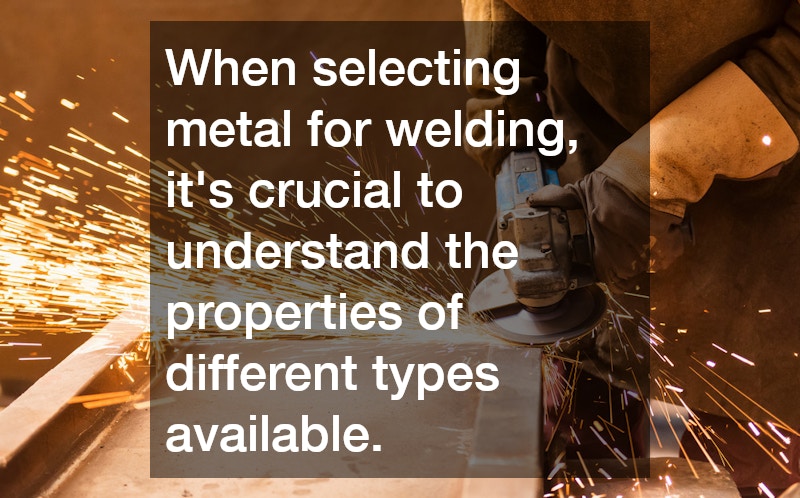Whether you’re a professional welder or diving into DIY projects, understanding the fundamentals of metal selection can significantly impact the quality of your welds. With a growing reliance on metalwork in industries and home projects alike, knowing what to consider when buying metal for welding is indispensable. Here’s a comprehensive guide to help you make informed decisions.
Understanding Different Types of Metals
When selecting metal for welding, it’s crucial to understand the properties of different types available. Steel, aluminum, and stainless steel are three common types used in welding projects.
Each type of metal has distinct characteristics that affect how they are welded and their performance in use. For instance, steel is known for its toughness and versatility, while aluminum is prized for its light weight and corrosion resistance. Understanding these characteristics allows for better decision-making based on the project requirements.
Steel fabrication services often highlight the popularity of various metals in industrial settings, where steel remains the most widely used metal. However, the choice between standard carbon steel and its high-strength variants can affect factors like cost, weldability, and finished strength. High-strength, low-alloy steels may offer superior qualities in terms of toughness and fatigue resistance, yet they may require specific welding procedures to maintain structural integrity. It’s critical to align metal characteristics with the intended application of the welded product.
Another vital aspect when buying metals, especially for large projects, is the metal’s form and thickness. Sheets, plates, bars, and tubes each serve different purposes and can impact the welding process. For example, welding thin sheets might require lower heat to prevent warping and ensuring that joints are solid. Therefore, understanding what form and thickness is necessary for your project ensures more efficient working conditions and satisfactory end results.
Considering Metal Quality and Source
The quality of metal is a defining factor in the success of welding projects, yet identifying quality can be challenging. One of the key indicators is the supplier’s reputation and certifications they hold. Reliable steel fabrication services can provide traceability of the metal, ensuring it meets industry standards. Moreover, asking about the source of the metal can reveal a lot about its quality. Metals sourced from manufacturers with stringent quality control measures are generally more reliable.
Impurities in metal can significantly impact the strength and longevity of a weld. For instance, metals with excessive sulfur or phosphorus may present welding difficulties, such as increased brittleness. Choosing a reputable supplier who offers test certificates for their product can ensure that you are aware of the metal’s composition before committing to a purchase. Ensuring that metals are free from defects like cracks, voids, or inclusions is crucial in optimizing performance and reducing the need for costly repairs or reinforcements.
Furthermore, consistency is key, especially for projects requiring large quantities of metal. Variations in batches can lead to inconsistencies in welding performance, impacting the project’s overall quality and safety. Steel fabrication services often emphasize the importance of purchasing standardized metal grades to maintain consistency when fabricating parts. Clear communication with your supplier about the project’s requirements can pave the way for receiving the right quality and consistency needed.
Evaluating the Cost Implications
Cost is always a vital consideration when buying metal for any welding project. The cost of metal can vary based on factors such as type, grade, thickness, and procurement volume. While it can be tempting to opt for cheaper alternatives, they may incur hidden expenses if the quality is compromised. Cheaper metals might require more intense preparation or special treatments before welding, which can inflate labor costs. Therefore, a balanced approach, considering both cost and quality, often ensures a more economical choice in the long run.
Bulk purchasing from a steel fabrication service can sometimes mitigate costs, provided storage and transportation logistics do not counteract savings. Negotiating terms with your supplier, especially for large-scale projects, can also lead to discounts or favorable credit terms. However, it’s important to remain mindful of the trade-off between cost and the logistics of storage, transport, and handling. Planning these aspects effectively can prevent financial inefficiencies.
Additionally, the cost of metals can fluctuate due to market conditions. Factors like supply chain changes, geopolitical influences, and demand fluctuations affect market prices. Staying informed about these market trends can help in making timely purchases and avoiding times of peak price surges. Collaborating with knowledgeable steel fabrication services can be beneficial in tracking and understanding these trends, ensuring you secure the metals at the best possible rates.
Impacts of Environmental and Service Conditions
The environment where the welded product will be used should also inform metal selection. Corrosive environments might necessitate metals like stainless steel or aluminum, which offer better resistance to rust and environmental degradation. Understanding the service conditions can drastically influence the performance and longevity of the weld. For example, metals used in outdoor applications should offer robust resistance to weather-induced corrosion, which might not be necessary for indoor use. Aligning the metal choice with environmental conditions ensures extended durability and performance.
Additionally, the operational conditions such as exposure to high temperatures, pressures, or mechanical stresses should be considered. Different metals behave uniquely under various stress conditions, and it is essential to select a type that meets these specific demands. For instance, high-strength steel might be more appropriate for structures facing dynamic loads or shocks. Consulting with experts or steel fabrication services can help in analyzing these specific requirements, guiding the correct choice for optimal performance.
Design considerations such as weight constraints and aesthetic demands also play a role in metal choice. Aluminum might be preferred for applications where weight savings are crucial, while its natural oxide layer provides a clean, attractive finish. Conversely, stainless steel might be chosen for its sleek appearance and low maintenance needs in architectural applications. Balancing functional requirements with design needs helps in achieving both practicality and visual appeal in your welded projects.
The Role of Expert Advice
Consultation with experts and professionals in steel fabrication services can provide invaluable insight when selecting metals for welding. These professionals bring extensive experience and technical knowledge that can aid in understanding complex project requirements. Through their expertise, you can better navigate through numerous metal types, advantages, disadvantages, and specific welding challenges. Their guidance can help avert potential pitfalls and optimize your project’s efficiency and output quality.
Experts can also offer advice on the most recent technological advancements and material innovations within the industry. These insights allow you to take advantage of new solutions that may offer greater benefits than traditional materials and methods. Whether it’s trying out a new alloy or adopting advanced welding techniques, expert consultancy ensures you remain at the cutting edge of craftsmanship. It allows you to make well-informed decisions aligned with industry trends.
Additionally, engaging with skilled steel fabrication service providers ensures that your processes and materials meet regulatory standards and safety requirements. The correct application of standards and protocols is paramount to ensuring both practical efficacy and legal compliance. Professionals can provide authoritative advice on conforming to enhanced safety checks and proactive measures. As such, working alongside experienced professionals boosts assurance and reliability in your welding projects.
In conclusion, the metal you choose for welding significantly affects the outcome and performance of your created work. Understanding the nuances of metal type, quality, cost, environmental impact, and professional advice are essential pillars of a successful welding project. By considering these factors, you can ensure your welded pieces are not only effective but also durable and visually appealing.



